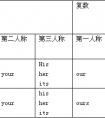完成句子。1. A: A computer is on the teacher's desk.B: ________ ________ a computer on the teacher's desk. 2. A: We play basketball on Wednesday, Friday an-九年级英语
2.There be 句型可以和各种助动词、情态动词连用。
There may be a cigarette in that box.那只盒子里或许有支香烟。
There must be some cakes on the table.桌子上一定有些蛋糕。
There used to be a hospital there before the war.战前,那里曾经有家医院。
3.There be 句型也可以和这样一些的谓语动词连用:be going to 、seem to 、appear to 、used to、be likely to 、happen to ….
There seem to be a few trees between me and the green.在我与草坪之间好像有一些树。
There is gong to be a meeting tonight.今天晚上有个会议。
There is likely to be a storm.可能有一场暴雨。
There happened to be a bus nearby.碰巧附近有辆公交车。
There appears to have been a nasty accident.似乎发生了一起严重事故。
4.there be 结构中除可以用be 外,还可以用其它动词。例如:
There came a scent of lime-blossom.飘来一阵菩提树的花香。
Once upon a time there lived a king in China.从前中国有一个国王。
There be 结构的非谓语动词形式是there to be 和there being 两种形式。在句中作主语、宾语和状语。
1. there being 结构起名词的作用,直接位于句首作主语,通常用it 作形式主语,并且用for引导。
There being a bus stop near my house is a great advantage.我家旁边有个公共汽车站,很是方便。
It is impossible for there to be any more.不可能再有了。
2. there be 结构作宾语时,通常用there to be ,常作这样一些词的宾语:
expect,like, mean, intend, want,prefer,hate等。
I expect there to be no argument about this.我期望关于这件事不要再争吵了。
I should prefer there to be no discussion of my private affairs.我宁愿不要讨论我的私事。
People don’t want there to be another war.人们不希望再有战争了。
另外,作介词宾语时,如果是介词for,只能用“there to be”其它介词用“there being”
The teacher was waiting for there to be complete silence.老师在等着大家都安静下来。
I never dreamed of there being any good chance for me.我做梦也没想到我会有好机会。
3. 作状语的there be 形式,通常用“there being”结构。
There being nothing else to do ,we went home.因为没有其他事可做,我们就回家了。
They closed the door ,there being no customers.因为没有顾客,他们的店关门了。
考点名称:可数名词(单数名词,复数名词)
- 可数名词:
是指能以数目来计算,可以分成个体的人或东西;
因此它有复数形式,当它的复数形式在句子中作主语时,句子的谓语也应用复数形式。 - 名词单数变复数的规则:
巧记以f\fe结尾的可数名词复数情况 构成方法 例词 读音 一般情况 在词尾加-s desk→desks
map→maps-s在清辅音后发/s/ day→days
girl→girls-s在元音和浊辅音后发/z/ 以s,x,ch,sh结尾的词 在词尾加-es bus→buses box→boxes watch→watches fish→fishes -es发/iz/音 以辅音字母加-y结尾的词 变y为i再加-es family→families
factory→factories
party→patries-ies发/iz/音 以元音字母加-y结尾的词 在词尾加-s day→days
boy→boys
key→keys-s发/z/音 以f或fe结尾的词 变f或fe为v再加-es knife→knives
life→lives
wife→wives
half→halves-ves发/vz/音 以辅音字母加-o结尾的词 在词尾加-es potato→potatoes
tomato→tomatoes
hero→heroes-es发/z/音 以元音字母加-o结尾的词 在词尾加-s radio→radios
zoo→zoos-s发/z/音
妻子骑牛拿起刀,wife,calf,knife ↑
追得贼狼满街跑,thief,wolf →→→变f或fe为v,再加es
碰倒架子丧己命,shelf,self,life ↓
手帕树叶半空飘。handkerchief,leaf,half ↓ - 名词复数的不规则变化:
1.不规则形式:
child→children(儿童)
man→men(男人)
woman→women (女人)
an Englishman→two Englishmen(英国人)
foot→feet(脚)
tooth→teeth(牙)
mouse→mice(老鼠)
ox →oxen(公牛)
goose→geese(鹅)
2.单复同形:
deer,sheep,fish,Chinese,Japanese, species,means,Swiss
除人民币,美元、英镑、法郎等都有复数形式。
如:a dollar,two dollars; a meter,twometers
3.集体名词,以单数形式出现,但实为复数:
people police cattle是复数
(OK :a person,a policeman,ahead of cattle,the English,the British,the French,the Chinese,the Japanese,the Swiss )
(Error:a people,a police,a cattle )
表示国民总称时,作复数用。
(The Chinese are industries and brave. 中国人民是勤劳勇敢的。)
4.以s结尾,仍为单数的名词
maths,politics,physics等学科名词,为不可数名词,是单数。
news是不可数名词。
5.表示由两部分构成的东西,
glasses(眼镜) trousers (长裤) clothes(衣服)
若表达具体数目,要借助数量词pair(对,双)a pair of glasses two pairs of trousers suit(套)
6.另外还有一些名词,其复数形式有时可表示特别意思
goods (货物) waters (水域) fishes (各种鱼) - 可数名词变复数的几种形式:
1) 单数名词加s: students, apples, bags, trees, books, brothers.
2) 以s、x、sh、ch结尾的名词加es: glasses, boxes, brushes, matches.
3) 以辅音字母加y结尾的名词,变y为i加es: cities, babies, enemies.
4) 以f或fe结尾的名词,多数变f为v加es: wives, knives.但有些词只加s: roofs,proofs, chiefs.
5) 以o结尾的名词,有些加es: Negroes, heroes, tomatoes, potatoes. 其它加s: radio s, zoos, pianos, photos.
6) 不规则名词:foot→feet, goose→geese, tooth→teeth, child→children, man→men, woman→women, mouse→mice.
7) 单复数同形的名词:sheep,fish,dee.
注意:fish表示种类时,也用fishes这样的形式。
考点名称:名词
- 名词:
是词性的一种,也是实词的一种,是指待人、物、事、时、地、情感、概念等实体或抽象事物的词。
名词可以独立成句。在短语或句子中通常可以用代词来替代。 名词分类:
一、按意义分类
1.专有名词
表示具体的人,事物,地点,团体或机构的专有名称(第一个字母要大写)。
例:China(中国)、Asia(亚洲) Beijing(北京)、the People’s Republic of China(中华人民共和国)。
专有名词如果是含有普通名词的短语,则必须使用定冠词the。
如:the Great Wall(长城)。
姓氏名如果采用复数形式,则表示该姓氏一家人(复数含义)。
如:the Greens( 格林一家人)。
2.普通名词
表示某些人,某类事物,某种物质或抽象概念的名称。
例如:teacher 老师、tea 茶、 reform 改革。
普通名词又可进一步分为五类:
①个体名词(Individual Nouns):表示单个的人和事物。
(car 汽车 room 房间 fan 风扇photo 照片)
②集体名词(Collective Nouns):表示一群人或一些事物的名称。
( people 人们 family 家庭 army 军队 government政府 group 集团 )
③复合名词:两个或两个以上名词连在一起构成的名词
(boy-friend男友 passer-by过路人 brother-in-law内兄)
④物质名词(Material Nouns):表示物质或不具备确定形状和大小的个体的物质。
( fire 火 steel 钢 air 空气 water 水 milk牛奶 )
⑤抽象名词(Abstract Nouns):表示动作,状态,品质或其他抽象概念。
( labour 劳动 health 健康 life 生活 friendship友情 patience耐力 )
二、按是否可数分类
名词又可分为可数名词(Countable Nouns)和不可数名词(Uncountable Nouns)
1、不可数名词是指不能以数目来计算,不可以分成个体的概念、状态、品质、感情或表示物质材料的东西;
- 最新内容
- 相关内容
- 网友推荐
- 图文推荐
| [家长教育] 孩子为什么会和父母感情疏离? (2019-07-14) |
| [教师分享] 给远方姐姐的一封信 (2018-11-07) |
| [教师分享] 伸缩门 (2018-11-07) |
| [教师分享] 回家乡 (2018-11-07) |
| [教师分享] 是风味也是人间 (2018-11-07) |
| [教师分享] 一句格言的启示 (2018-11-07) |
| [教师分享] 无规矩不成方圆 (2018-11-07) |
| [教师分享] 第十届全国教育名家论坛有感(二) (2018-11-07) |
| [教师分享] 贪玩的小狗 (2018-11-07) |
| [教师分享] 未命名文章 (2018-11-07) |

![—I want to know if ______ a concert in our school hall this weekend. —Yes. Nancy told me about it. [ ]A. there will have B. there will be C. will there be -九年级英语](http://www.00-edu.com/d/file/ks/4/2/there be juxing/2020-02-28/small8bcf29e494d6f99c2d7c4286c4836a101582899344.jpg)
![There_____ a potato and two tomatoes on the table. [ ]A. isB. areC. hasD. have-七年级英语](http://www.00-edu.com/d/file/ks/4/2/there be juxing/2020-02-28/small596b7df57071a5318d44b4246a8dfcf71582899941.jpg)

![Will there___any schools in the future?[ ]A. isB. areC. amD. be-七年级英语](http://www.00-edu.com/d/file/ks/4/2/there be juxing/2020-02-28/smallfaad594ad286847556f8b2a7bf4e6da41582899915.jpg)
![There is going to _____English movie tonight. [ ]A. be B. be an C. have D. have an -八年级英语](http://www.00-edu.com/d/file/ks/4/2/there be juxing/2020-02-28/small684c03bf16377c6f94e9f828954421a91582899285.jpg)
